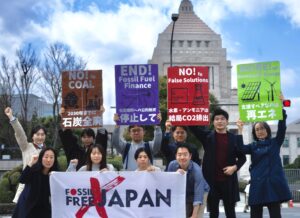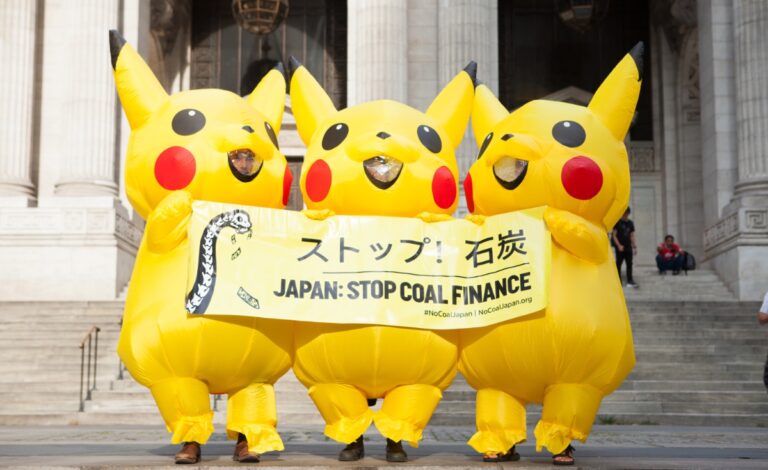
Japan, the world’s top financier of fossil fuels, is convening a series of meetings this week to drive the expansion of LNG and fossil-based technologies.
Finishing today is the 5th Japan Energy Summit, which calls itself a “global platform that convenes senior stakeholders” from government and industry to discuss “pertinent topics affecting the industry.” It is sponsored by some of the biggest gas companies in Japan and the US including Tokyo Gas, Venture Global LNG and Cheniere.
This is closely followed on March 4 by the Asia Zero Emission Community Ministerial meeting, which Japan is organizing to galvanize demand from energy ministers across the region for its dirty fossil-based technologies.
Both convenings are focused on technologies like LNG, ammonia co-firing, hydrogen and carbon capture and storage, which would prolong the use of fossil fuels. We have known for a while that Japan is addicted to fossil fuels. From 2012 to 2020, the country was the largest lender for fossil fuel projects. Between 2019 and 2021, Japan provided USD 10.6 billion on average each year for new gas, oil and coal projects.
The Japanese government and entrenched business interests are promoting the narrative that gas is a critical part of the energy transition, despite the fact that fossil fuels are responsible for the climate crisis. The energy summit is framed around the “critical role of LNG and gas in providing energy security” and how hydrogen and ammonia can be seen as “low carbon solutions.” Reuters reports that Japan is planning to “emphasize the importance of investments in natural gas, liquefied natural gas as well as cleaner fuels such as hydrogen and ammonia” during its G7 Presidency this year.
Such sentiments ignore the lessons of the Ukraine war, which has shown how dependency on foreign gas has undermined energy security. Nations have been scrambling for supplies and tens of millions of people living in fuel poverty have suffered as prices have escalated. OCI and other organizations have long argued that gas is not a bridge fuel and is a wall blocking the transition to clean energy.
Since the war, the global energy watchdog, the International Energy Agency, has outlined how “the economic disruption caused by the war in Ukraine has amplified calls for an accelerated energy transition. A shift that would move countries away from highly polluting fuels, often supplied by only a handful of major producers, to sources of low carbon energy such as renewables.”
It does not have to be this way.
Two reports published this week highlight how increasingly redundant gas is in the energy transition. The first is entitled “The 2035 Japan Report: Plummeting costs of solar, wind and batteries can accelerate Japan’s clean and independent electricity future,” published by the Lawrence Berkeley National Laboratory, which the U.S. Energy Department backs.
Researchers concluded that Japan could get ninety percent of its power from clean energy by 2035. This would be achievable “without coal generation or new natural gas plants.”
Ironically, the report states that Japan faces significant energy security risks if it continues to import nearly all of its fuel used in its power sector, including gas. The report highlights how reducing fossil fuel imports by eighty-five per cent with a ninety percent clean energy grid “can significantly bolster Japan’s energy security.” Such policies contradict those discussed in Tokyo this week, which advocate increasing LNG for energy security.
The second report published by Climate Integrate is entitled Decarbonizing Japan’s Electricity System: Policy Change to Trigger a Shift. This outlines the clear policies needed to increase the amount of clean energy produced in Japan, including setting a long-term vision centered on a shift to renewables.
The policies being recommended include “Expanding renewable energy in ways that benefit communities”, “Boosting offshore wind development”, “Improving energy efficiency”, and “using fiscal measures to support the energy shift.”
Kimiko Hirata, Executive Director of Climate Integrate said: “decarbonization of electricity in Japan can be achieved through the widespread promotion of renewable energy. This differs significantly from the Japanese government’s current direction with Green Transformation, such as ammonia and hydrogen…The barrier is not technology or cost but policy.”
Opposition is mounting across Asia with 140 groups from 18 countries urging Japanese Prime Minister Fumio Kishida in an open letter released today to stop undermining the energy transition.
“We stand firm in our opposition to fossil fuels and Japan’s dirty energy strategy for Asia with its “false solutions”, which are nothing but greenwashing lies,” concludes an op-ed published today by Gerry Arances from the Center for Energy, Ecology and Development in the Philippines and Dwi Sawung from WALHI – Friends of the Earth Indonesia.

